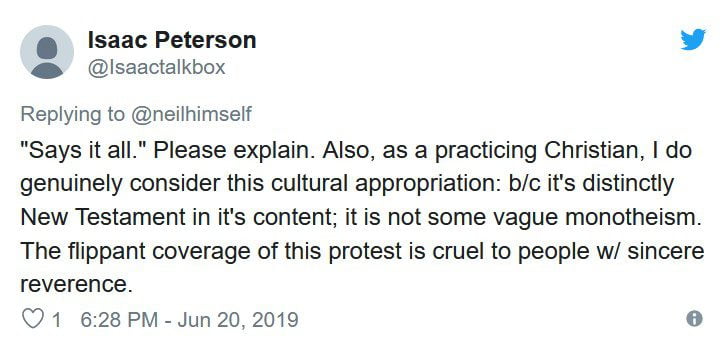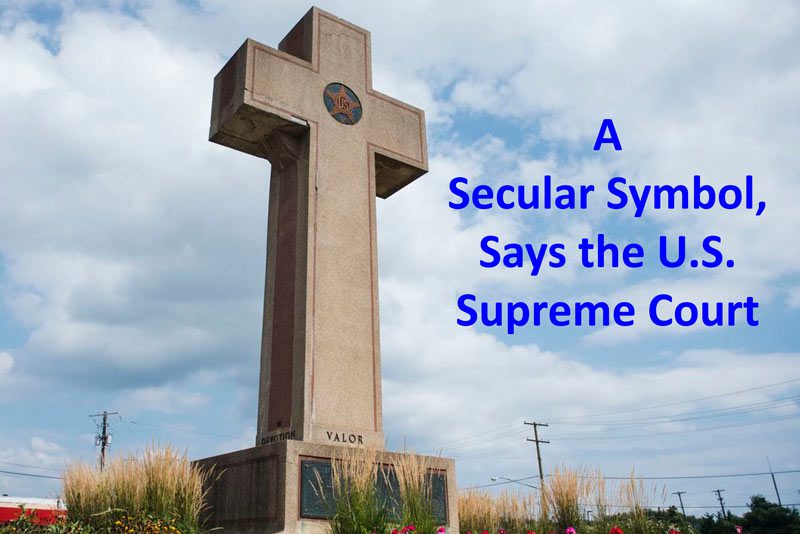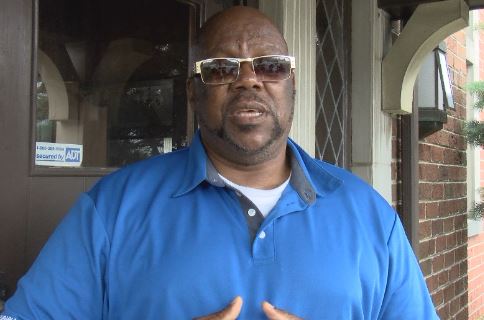
Frequently, it seems that Evangelical Christians and conservative Catholics are outraged over a program on network TV, Netflix, Amazon Prime, or many of the other media streaming services. We live in a day when the choices of what to watch are endless. As someone who loves watching television, I am thrilled that I have so many excellent programs to choose from. Of course, there are some channels that I don’t watch. One in particular is the Hallmark Channel. Gag me with a spoon! Fundamentalists, of course, love the Hallmark Channel. Its programming regularly reinforces their moralistic religious worldview. Fundamentalists watch the Hallmark Channel, I don’t. See how easy that is? It’s all about choice. We all choose to view what we want. No one is forcing Fundamentalists to watch programming that they deem sinful, offensive, or contrary to their version of Christian decency. For the life of me, I don’t understand why Evangelical Christians and conservative Catholics, if they are so offended by what is on the screen, don’t turn off their televisions, or better yet get rid of them altogether. (Please see The Preacher and His TV.) Psalm 101:3 says: I will set no wicked thing before mine eyes: I hate the work of them that turn aside; it shall not cleave to me. If what is on the TV is so wicked, why do Fundamentalists continue to own televisions? Perhaps, it is time for them to become Amish and throw their hellivisions into the trash. Of course, most Fundamentalists won’t do this. Why? Because they like watching TV just like most of us. Remember, Fundamentalists scream long and hard (no I am not talking about their sex lives) about the moral failures of our society, yet they, all too often, imbibe in the very “sins” they condemn.
Earlier this week, the American Society for the Defense of Tradition, Family, and Property (ASDTFP) — a Roman Catholic organization — put up an online petition that called on Netflix to immediately cancel Good Omens — a television series adapted from the late Terry Pratchett’s (an atheist) and Neil Gaiman’s (view of God: “I think we can say that God exists in the DC Universe. I would not stand up and beat the drum for the existence of God in this universe. I don’t know, I think there’s probably a 50/50 chance. It doesn’t really matter to me.”) 1990 fantasy novel, Good Omens: The Nice and Accurate Prophecies of Agnes Nutter, Witch. Never mind the fact that Good Omens is not on Netflix, it’s on Amazon Prime. Damn, if you are going to protest a TV program, at least you can do is make sure you have your facts straights. After several days of being roundly mocked in news stories and on social media, ASDTFP corrected their petition. Thanks be to Loki, their faux outrage is now directed at the right streaming company. So far, 20,621 offended souls have signed the petition.
Other programs ASDTFP objects to include the Cartoon Network promoting “gay pride,” Fleabag on Amazon Prime, Arthur on PBS, and Miracle Workers on TBS. The man behind the Good Omens petition is none other than Fundamentalist Catholic apologist John Horvat II. What is it about Good Omens that so offends Horvat II and the fine Catholics at ASDTFP? Their petition states:
The Amazon series “Good Omens,” based on a book by Terry Pratchett and Neil Gaiman, portrays the agents of Good and Evil as fighters in an arbitrary struggle devoid of meaning and truth. This series presents devils and Satanists as normal and even good, where they merely have a different way of being, and mocks God’s wisdom in the following ways:
• An angel and demon are good friends, and are meant to be earth’s ambassadors for Good and Evil respectively.
• This pair tries to stop the coming of the Antichrist because they are comfortable and like the earth so much.
• God is voiced by a woman.
• The Antichrist, who will oppose the Kingdom of God, is portrayed as a normal kid that has special powers and a mission to destroy the world which he doesn’t really want to do.
• There are groups of Satanic “nuns” that are chosen to raise the Antichrist.
• The four riders of the Apocalypse, God’s means of punishing sinful earth, are portrayed as a group of bikers.
In the end, this is a denial of Good and Evil: morality and natural law do not exist, just humanitarianism and an ultimately useless creed. This is another step to make Satanism appear normal, light and acceptable. We must show our rejection. Please sign our petition, telling Amazon that we will not stand silent as they destroy the barriers of horror we still have for evil.
So, let me get this straight: Horvat II and his merry band of God/Jesus/Mary worshippers is all bent out of shape over how fictional Bible characters are portrayed in Good Omens? Okay then . . .
Neil Gaiman tweeted the following after hearing about the petition drive:
“I love that they are going to write to Netflix to try and get #GoodOmens cancelled. Says it all really. This is so beautiful … Promise me you won’t tell them?”
Gaiman later tweeted:
“Says it all.” They are asking Netflix, a company who does not broadcast #GoodOmens to “cancel” Good Omens, a show broadcast on another network, and already complete and out. I find it difficult to respond to them with anything other than flippancy. No, not difficult. Impossible.
A tweet by Evangelical Christian Isaac Peterson perhaps explains best the sentiment behind the outrage over Good Omens:

In Peterson’s mind, the Bible belongs to Christians and it is “cultural appropriation” for Terry Pratchett and Neil Gaiman to take and use what doesn’t belong to them — damn heathens that they are. First, Good Omens is based on the book Good Omens: The Nice and Accurate Prophecies of Agnes Nutter, Witch, and not the Bible. Not that it would matter. The Bible is a work of fiction too, so what’s the harm in adapting its stories and themes into TV programs and movies? According to Wikipedia, the plot of the book goes something like this:
It is the coming of the End Times: the Apocalypse is near, and Final Judgement will soon descend upon the human species. This comes as a bit of bad news to the angel Aziraphale (who was the guardian of the Eastern Gate of Eden) and the demon Crowley (who, when he was originally named Crawly, was the serpent who tempted Eve to eat the apple), respectively the representatives of Heaven and Hell on Earth, as they have become used to living their cosy, comfortable lives and have, in a perverse way, taken a liking to humanity. As such, since they are good friends (despite ostensibly representing the polar opposites of Good and Evil), they decide to work together and keep an eye on the Antichrist, destined to be the son of a prominent American diplomat stationed in Britain, and thus ensure he grows up in a way that means he can never decide between Good and Evil, thereby postponing the end of the world.
In fact, Warlock, the child who everyone thinks is the Anti-Christ, is a normal eleven-year-old boy. Due to the mishandling of several infants in the hospital, the real Anti-Christ is Adam Young, a charismatic and slightly otherworldly eleven-year-old living in Lower Tadfield, Oxfordshire, an idyllic town in Britain. Despite being the harbinger of the Apocalypse, he has lived a perfectly normal life as the son of typical English parents, and as a result has no idea of his true powers. He has three close friends – Pepper, Wensleydale and Brian – who collectively form a gang that is simply referred to as “Them” by the adults.
As the end of the world nears, Adam blissfully and naively uses his powers, changing the world to fit things he reads in a conspiracy theory magazine, such as raising the lost continent of Atlantis and causing Little Green Men to land on earth and deliver a message of goodwill and peace. In the meantime, the Four Horsemen of the Apocalypse assemble: War (a war correspondent), Death (a biker), Famine (a dietician and fast-food tycoon), and Pollution (the youngest–Pestilence having retired after the discovery of penicillin). The incredibly accurate (yet so highly specific as to be useless) prophecies of Agnes Nutter, 17th-century prophetess, are rapidly coming to pass.
Agnes Nutter was a witch in the 17th century and the only truly accurate prophet to have ever lived. She wrote a book called The Nice and Accurate Prophecies of Agnes Nutter, Witch, a collection of prophecies that did not sell very well because they were unspectacular, cryptic and all true. She, in fact, decided to publish it only so she could receive a free author’s copy. This copy is passed down to her descendants, and is currently owned by her multi-great granddaughter Anathema Device. Agnes was burned at the stake by a mob; however, because she had foreseen her fiery end and had packed 80 pounds of gunpowder and 40 pounds of roofing nails into her petticoats, everyone who participated in the burning was killed instantly.
As the world descends into chaos, Adam attempts to split up the world between his gang. After realizing that by embracing absolute power, he will not be able to continue to grow up as a child in Lower Tadfield, Adam decides to stop the apocalypse.
Anathema, Newton Pulsifer, Sergeant Shadwell (the two last members of the Witchfinder Army), Madame Tracey (a medium and Shadwell’s neighbour), Adam and his gang, Aziraphale and Crowley gather at a military base near Lower Tadfield to stop the Horsemen from causing a nuclear war and ending the world. Adam’s friends capture War, Pollution, and Famine. Just as Adam’s real father, the devil, seems set to come and force the end of the world, Adam twists everything so his human father shows up instead, and everything is restored.
In the aftermath of the prevented Apocalypse, Crowley and Aziraphale discuss their restored property and the possibility of a second Apocalypse between humanity and the combined forces of Heaven and Hell; Shadwell and Madame Tracey decide to get married and move into a bungalow together; Anathema receives a sequel to Agnes Nutter’s prophecies but does not read it so as to not be bound by them; and Adam evades his grounding to go scrumping.
Sure, I see some similarities between Good Omens and the Bible, but Good Omens is hardly Cecil B. DeMille’s Ten Commandments. Peterson doth protest too much.
Second, since when in a free society is the Bible or religion in general off limits? Sorry, but religious books, beliefs, and ideas are fair game for critique, criticism, and ridicule. Third, is Peterson really arguing that Good Omens “hurt” his feelings and those of people who treat Christianity with the “proper” modicum of reverence and respect it deserves? Behind Peterson’s feigned offense is the idea that if religious beliefs are “sincere” then they should not be criticized. I wonder if people such as Peterson have really thought about how stupid this kind of thinking really is? We humans “sincerely” believe all sorts of bat-shit crazy stuff. Smart, educated people can and do believe things that defy reason and common sense; you know, beliefs such as a virgin having a baby, dead people coming back to life, walking on water, turning water into wine, walking through walls, and healing blindness with mud and spit, to name a few. Many of these same people believe the earth is 6,023 years old, a universal flood destroyed the world a few thousand years ago, a man named Moses led millions of people on foot across the desert from Egypt to Canaan, and God lives inside of them, talking to them each and every day. Think about all the anti-scientific woo people believe: you know like vaccines cause autism and essential oils cure a plethora of diseases. The world is awash in nonsense. Should we not combat bad thinking and ideas, especially if they cause psychological and physical harm? Pray tell, why should religion be exempt from similar treatment?
What Horvat II and ASDTFP, along with the American Family Association, One Million Moms, and Parents Television Council — whom all have articles and petitions on their websites expressing outrage over TV programming — need to do to quell their outrage is this: DON’T WATCH TV! Don’t like Good Omens? Don’t watch it. Exercise your free will and change the channel. Better yet, get rid of your TVs. You see, the real issue here is that these groups want to control what the rest of us watch. If they can’t watch Good Omens, by golly we can’t watch it either. And therein is the core of Fundamentalist thinking: controlling others. Think about the current culture war these very same people are waging against LGBTQ people, same-sex marriage, fornication, masturbation, birth control, abortion, Democrats, socialism, liberal Christians, and a host of other “sins.” Their goal is to legislate and ban any behavior or group they deem “sinful” and an affront to the Christian God. Bound by their religion’s moral strictures and chains, Fundamentalists demand all of us submit to the same bondage. Sorry, but that ain’t going to happen. Those of us who have escaped the pernicious claws of Fundamentalist Christianity, along with our unwashed, uncircumcised Philistine brethren in the “world,” have no intentions of letting Fundamentalists have their way.
Time to binge watch Good Omens this weekend.
About Bruce Gerencser
Bruce Gerencser, 62, lives in rural Northwest Ohio with his wife of 41 years. He and his wife have six grown children and twelve grandchildren. Bruce pastored Evangelical churches for twenty-five years in Ohio, Texas, and Michigan. Bruce left the ministry in 2005, and in 2008 he left Christianity. Bruce is now a humanist and an atheist. For more information about Bruce, please read the About page.
Thank you for reading this post. Please share your thoughts in the comment section. If you are a first-time commenter, please read the commenting policy before wowing readers with your words. All first-time comments are moderated. If you would like to contact Bruce directly, please use the contact form to do so.
Donations are always appreciated. Donations on a monthly basis can be made through Patreon. One-time donations can be made through PayPal.
Share This Post On Social Media:










